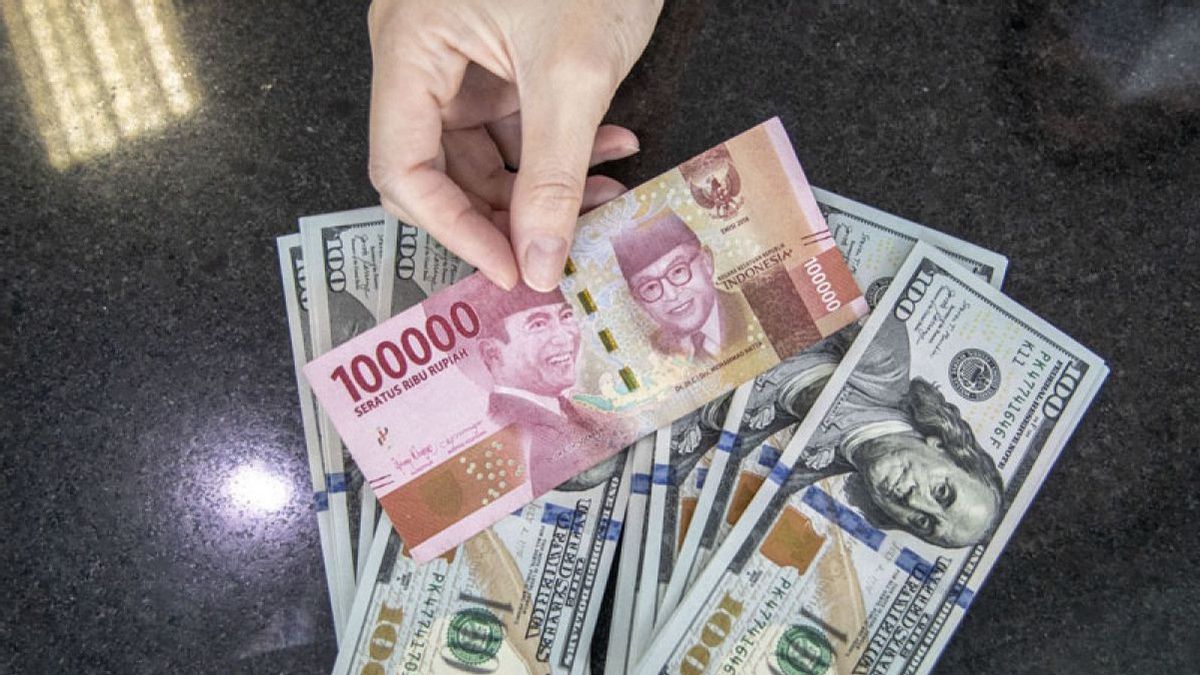JAKARTA - Head of Bank Permata economist Josua Pardede assesses that Bank Indonesia (BI) will continue to maintain the benchmark interest rate or BI Rate at the level of 6 percent in the future.
For information based on Bloomberg, the rupiah spot closed down 0.14 percent to a price level of IDR 15,920 per US dollar on Wednesday, April 3, 2024 trading.
Similarly, the rupiah at the Jakarta Interbank Spot Dollar Rate (Jisdor) Bank Indonesia (BI) rose 0.06 percent to the level of IDR 15,923 per US dollar.
Josua conveyed that both external and domestic challenges will affect Bank Indonesia's (BI) decision to determine the timing and magnitude of the BI-rate cut in the future.
"In the short term, coupled with the increased risk of inflation, especially in terms of food prices, it will make Bank Indonesia tend to maintain BI-rate at the current level with cutting space likely to occur in the second half of this year," he explained to VOI, Wednesday, April 3, 2024.
Josua said that Bank Indonesia has and will continue to take stabilization steps such as triple intervention in the USD/IDR spot market, the DNDF market and the bond market.
In addition, BI will optimize the strengthening of a pro-market monetary operations strategy for the effectiveness of monetary policy, including optimizing the Rupiah Securities of Bank Indonesia (SRBI), Bank Indonesia Valas Securities (SVBI), and Bank Indonesia Sukuk Valas (SUVBI).
"With these various stabilization measures, in the short term, it is estimated that Rupiah will tend to be stable in the range of Rp. 15,900," he explained.
Josua said that the weakening of the rupiah exchange rate in recent weeks was influenced by several factors. First, uncertainty regarding the direction of global interest rates has increased in recent weeks.
He gave an example that the world's major central banks tend to divergent in determining the direction of their monetary policy.
For example, the European Central Bank (ECB) and the Bank of England (BoE) provide a dovish signal, where the cut in benchmark interest rates is likely to occur sooner this year.
Meanwhile, the Swiss National Bank (SNB) is the world's main central bank to cut the benchmark interest rate for the first time this year, in line with its inflation rate which is consistently below its target target.
Josua said that in contrast to most central banks, the Bank of Japan (BoJ) even decided to leave the negative benchmark interest rate zone by raising its short-term interest rate.
The Fed reiterated that its monetary decision in the future will remain based on the latest developments in economic indicators.
"The development of the global interest rate condition that tends to be divergent has made the risk-off sentiment in the developing country market, including Indonesia, increase again. This can be seen especially in the Indonesian bond market, which has recorded a year-to-date net outflow," he explained.
According to Josua, many investors and traders tend to move their portfolio back to safe-haven assets, triggering capital outflows from developing country financial markets and encouraging the weakening of Asian currencies including the Rupiah.
He said, Indonesia must also be faced with the risk of a return of twin deficits or conditions in which the economy records widening the current account deficit and fiscal deficit.
The latest data shows that Indonesia's trade balance surplus continues to shrink, in line with the continued normalization of commodity prices and China's economic condition, Indonesia's main trading partner, which tends to continue to weaken.
SEE ALSO:
This increases the risk of widening the deficit on the current account balance this year.
From a fiscal point of view, there is uncertainty related to future government programs where many parties consider it to be quite aggressive so that it can encourage a significant increase in state spending.
On the other hand, state revenues tend to decline in line with the normalization of commodity prices.
Recent data shows that the APBN still recorded a surplus, but when compared to the same period position last year, the surplus tends to decrease.
"This raises concerns regarding the future state budget financing, thus providing negative sentiment on the Indonesian bond market. It is recorded that foreign ownership in Government Securities (SBN) continues to decline from the beginning of the year," he explained.
The English, Chinese, Japanese, Arabic, and French versions are automatically generated by the AI. So there may still be inaccuracies in translating, please always see Indonesian as our main language. (system supported by DigitalSiber.id)
















